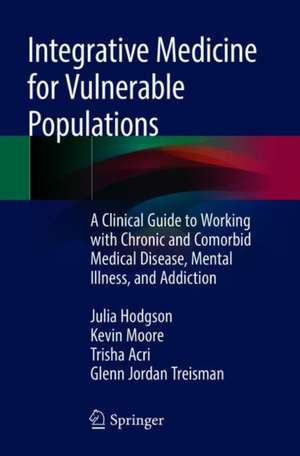Integrative Medicine for Vulnerable Populations: A Clinical Guide to Working with Chronic and Comorbid Medical Disease, Mental Illness, and Addiction
Autor Julia Hodgson, Kevin Moore, Trisha Acri, Glenn Jordan Treismanen Limba Engleză Paperback – 14 noi 2019
This first-of-its-kind title addresses the failures of an often fragmented healthcare system in managing vulnerable patients with multiple, chronic, co-morbid conditions -- patients who are frequently unresponsive to the methods and approaches used to treat other patients with conditions that are less complicated. The book emphasizes a holistic evaluation to patient care that looks at the whole patient, providing comprehensive formulations that describe the interacting problems that afflict the patient, including elements that are barriers to effective treatment of active medical problems and barriers to recovery. The book begins by defining integrated care, discussing the types of patients who benefit from this approach and some of the models of care, including financing, barriers to acceptance, and advocacy for patients. The second section discusses the structural elements of integrated care, including the building of a team approach, issues of leadership, and role definition, as well as the authors’ experiences in overcoming some of the problems. In the remaining sections, the book discusses major complicating features of the patients seen in integrative care settings, including a description of the kinds of problems, a model for formulation of patient cases, and successful approaches to treatment of these problems. Finally, some of the real-world applications where integrative care provides better outcomes is covered, including in terms of addictions, medically complex patients, and chronic pain patients. Integrative Medicine for Vulnerable Populations - A Clinical Guide to Working with Chronic and Comorbid Medical Disease, Mental Illness, and Addiction is a major contribution to the clinical literature and will be of great interest to health care professionals, administrators, policy stakeholders, and even interested patients and patient advocates.
Preț: 393.15 lei
Preț vechi: 413.85 lei
-5% Nou
Puncte Express: 590
Preț estimativ în valută:
75.24€ • 78.26$ • 62.11£
75.24€ • 78.26$ • 62.11£
Carte tipărită la comandă
Livrare economică 11-17 aprilie
Preluare comenzi: 021 569.72.76
Specificații
ISBN-13: 9783030216108
ISBN-10: 3030216101
Pagini: 230
Ilustrații: XI, 198 p. 42 illus., 33 illus. in color.
Dimensiuni: 155 x 235 mm
Greutate: 0.27 kg
Ediția:1st ed. 2020
Editura: Springer International Publishing
Colecția Springer
Locul publicării:Cham, Switzerland
ISBN-10: 3030216101
Pagini: 230
Ilustrații: XI, 198 p. 42 illus., 33 illus. in color.
Dimensiuni: 155 x 235 mm
Greutate: 0.27 kg
Ediția:1st ed. 2020
Editura: Springer International Publishing
Colecția Springer
Locul publicării:Cham, Switzerland
Cuprins
Section One Foundational Concepts of Integrative Medicine.- Chapter 1 Fundamental Concepts of Integrative Medicine.- Chapter 2 Models of Integrative Practice.- Chapter 3 Requisite Practices of Integrative Medicine.- Section Two Conceptualization and Diagnosis in Integrative Medicine.- Chapter 4 Understanding the Disease of Addiction.- Chapter 5 The Four Facets of Patient Conceptualization.- Chapter 6 Diagnostic Decision Making Processes.- Section Three Treatment within an Integrative Medicine Model.- Chapter 7 Behavioral and Psychological Interventions for Addiction.- Chapter 8 Adjunctive Pharmacotherapy for Opioid Addictions.- Chapter 9 Applying Integrative Medicine Skills to a Case Example.- Section Four Logistical Considerations of Integrative Care.- Chapter 10 Setting Up an Integrative Medicine Team.- Chapter 11 An Integrative Training Model.- Chapter 12 Applying Coordinated Treatment Skills to a Case Example.- Chapter 13 Sample Patient Guide to Care.- Chapter 14 Conclusion.
Notă biografică
Julia Hodgson, PsyD, MEd
The Center for Integrative Medicine/AIDS Care Group
Sharon Hill, PA 19079-1411 USA
Kevin Moore, PsyD
Courage Medicine Health Center
Philadelphia, PA, 19038 USA
Trisha Acri, MD MSCE
Courage Medicine Health Center
Philadelphia, PA 19107 USA
Glenn J. Treisman MD, PhD
Eugene Meyer III Professor of Psychiatry and Medicine
Johns Hopkins University School of Medicine
Departments of Psychiatry and Behavioral Sciences and Internal Medicine
Baltimore MD 21287 USA
The Center for Integrative Medicine/AIDS Care Group
Sharon Hill, PA 19079-1411 USA
Kevin Moore, PsyD
Courage Medicine Health Center
Philadelphia, PA, 19038 USA
Trisha Acri, MD MSCE
Courage Medicine Health Center
Philadelphia, PA 19107 USA
Glenn J. Treisman MD, PhD
Eugene Meyer III Professor of Psychiatry and Medicine
Johns Hopkins University School of Medicine
Departments of Psychiatry and Behavioral Sciences and Internal Medicine
Baltimore MD 21287 USA
Textul de pe ultima copertă
This first-of-its-kind title addresses the failures of an often fragmented healthcare system in managing vulnerable patients with multiple, chronic, co-morbid conditions -- patients who are frequently unresponsive to the methods and approaches used to treat other patients with conditions that are less complicated. The book emphasizes a holistic evaluation to patient care that looks at the whole patient, providing comprehensive formulations that describe the interacting problems that afflict the patient, including elements that are barriers to effective treatment of active medical problems and barriers to recovery. The book begins by defining integrated care, discussing the types of patients who benefit from this approach and some of the models of care, including financing, barriers to acceptance, and advocacy for patients. The second section discusses the structural elements of integrated care, including the building of a team approach, issues of leadership, and role definition, as well as the authors’ experiences in overcoming some of the problems. In the remaining sections, the book discusses major complicating features of the patients seen in integrative care settings, including a description of the kinds of problems, a model for formulation of patient cases, and successful approaches to treatment of these problems. Finally, some of the real-world applications where integrative care provides better outcomes is covered, including in terms of addictions, medically complex patients, and chronic pain patients. Integrative Medicine for Vulnerable Populations - A Clinical Guide to Working with Chronic and Comorbid Medical Disease, Mental Illness, and Addiction is a major contribution to the clinical literature and will be of great interest to health care professionals, administrators, policy stakeholders, and even interested patients and patient advocates.
Caracteristici
Comprehensive analysis of managing vulnerable patients with multiple, chronic, co-morbid conditions Model based on extensive, collected data from patient cases and outcomes Written by experts in the field















